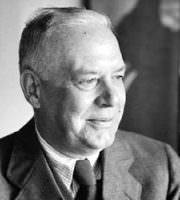by Wallace Stevens
The book of moonlight is not written yet
Nor half begun, but, when it is, leave room
For Crispin, fagot in the lunar fire,
Who, in the hubbub of his pilgrimage
Through sweating changes, never could forget
That wakefulness or meditating sleep,
In which the sulky strophes willingly
Bore up, in time, the somnolent, deep songs.
Leave room, therefore, in that unwritten book
For the legendary moonlight that once burned
In Crispin's mind above a continent.
America was always north to him,
A northern west or western north, but north,
And thereby polar, polar-purple, chilled
And lank, rising and slumping from a sea
Of hardy foam, receding flatly, spread
In endless ledges, glittering, submerged
And cold in a boreal mistiness of the moon.
The spring came there in clinking pannicles
Of half-dissolving frost, the summer came,
If ever, whisked and wet, not ripening,
Before the winter's vacancy returned.
The myrtle, if the myrtle ever bloomed,
Was like a glacial pink upon the air.
The green palmettoes in crepuscular ice
Clipped frigidly blue-black meridians,
Morose chiaroscuro, gauntly drawn.
How many poems he denied himself
In his observant progress, lesser things
Than the relentless contact he desired;
How many sea-masks he ignored; what sounds
He shut out from his tempering ear; what thoughts,
Like jades affecting the sequestered bride;
And what descants, he sent to banishment!
Perhaps the Arctic moonlight really gave
The liaison, the blissful liaison,
Between himself and his environment,
Which was, and is, chief motive, first delight,
For him, and not for him alone. It seemed
Elusive, faint, more mist than moon, perverse,
Wrong as a divagation to Peking,
To him that postulated as his theme
The vulgar, as his theme and hymn and flight,
A passionately niggling nightingale.
Moonlight was an evasion, or, if not,
A minor meeting, facile, delicate.
Thus he conceived his voyaging to be
An up and down between two elements,
A fluctuating between sun and moon,
A sally into gold and crimson forms,
As on this voyage, out of goblinry,
And then retirement like a turning back
And sinking down to the indulgences
That in the moonlight have their habitude.
But let these backward lapses, if they would,
Grind their seductions on him, Crispin knew
It was a flourishing tropic he required
For his refreshment, an abundant zone,
Prickly and obdurate, dense, harmonious
Yet with a harmony not rarefied
Nor fined for the inhibited instruments
Of over-civil stops. And thus he tossed
Between a Carolina of old time,
A little juvenile, an ancient whim,
And the visible, circumspect presentment drawn
From what he saw across his vessel's prow.
He came. The poetic hero without palms
Or jugglery, without regalia.
And as he came he saw that it was spring,
A time abhorrent to the nihilist
Or searcher for the fecund minimum.
The moonlight fiction disappeared. The spring,
Although contending featly in its veils,
Irised in dew and early fragrancies,
Was gemmy marionette to him that sought
A sinewy nakedness. A river bore
The vessel inward. Tilting up his nose,
He inhaled the rancid rosin, burly smells
Of dampened lumber, emanations blown
From warehouse doors, the gustiness of ropes,
Decays of sacks, and all the arrant stinks
That helped him round his rude aesthetic out.
He savored rankness like a sensualist.
He marked the marshy ground around the dock,
The crawling railroad spur, the rotten fence,
Curriculum for the marvellous sophomore.
It purified. It made him see how much
Of what he saw he never saw at all.
He gripped more closely the essential prose
As being, in a world so falsified,
The one integrity for him, the one
Discovery still possible to make,
To which all poems were incident, unless
That prose should wear a poem's guise at last.
Last updated January 14, 2019




